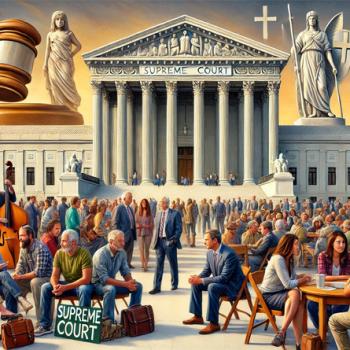(Originally posted February 1, 2011. This got lost in the migration from TypePad to WordPress, recovered and reposted for the archives here thanks to the Internet Archive Wayback Machine.)
Tribulation Force, pp. 326-330
In the universe of Left Behind, Israel faces none of the hostility and suspicion that it faces here in the real world. “Israel made peace with her neighbors,” we read on page 8 of the first book of the series, a nation shaped by “free trade and liberal passage. … Never had Israel enjoyed such tranquility.” It has become not only “the richest nation on earth,” but has also expanded far beyond its present-day borders. Somehow, we are told, the Israel of Left Behind has peacefully grown to include not only all of what is now the occupied West Bank, but also parts of Lebanon, Syria, Egypt and Jordan.
This seems beyond implausible. It seems impossible. Yet the authors — while not providing any credible explanation for how this has come to be — insist that this is what will happen very soon, here in the real world, because they say that this is what must happen. It is prophesied, they say, and therefore it will come to be. This vast expansion and annexation and the seemingly contradictory flourishing of fraternity with its neighbors, the authors say, are necessary for Bible prophecy to be fulfilled and so this is what the world of Left Behind must look like.
* * * * * * *
In the universe of Left Behind, Israel faces even greater hostility and suspicion than it faces here in the real world. It is a nation beset on all sides by enemies bent on its annihilation, hated by all Muslims and Arabs and hated even by those in distant lands. Russia and Ethiopia will be so filled with animosity toward Israel that they will launch an all-out joint assault, firing every missile in both countries’ arsenals in the attack. Israel will be so reviled and so isolated from every other nation that it alone will stand outside of the coming one-world government, forced to negotiate a tenuous peace treaty as a nation separate from the rest of the globe.
The authors do not explain how this increased hostility will come to be, yet they insist that this is what will happen very soon, here in the real world, because they say that this is what must happen. It is prophesied, they say, and therefore it will come to be. This ratcheting up of hostility with its neighbors and this imperiled isolation, the authors say, are necessary for Bible prophecy to be fulfilled and so this is what the world of Left Behind must look like.
* * * * * * *
One of the trickier aspects of reading these books is trying to match the authors stride-for-stride as they embrace contradictory ideas like those above. It doesn’t seem likely that both of those things could be true at the same time. Both could be false, of course, but if one of them were true then the other one would seem logically to have to be false. And if either were shown to be false, then we would have reason not to accept — not to be able to accept — the “Bible prophecy” scheme of Tim LaHaye.
I’m guessing that LaHaye’s explanation for this seeming contradiction would be that Israel isn’t really experiencing “tranquility” or “peace,” but that it had gullibly and naively come to believe the pretense of such tranquility and thus had been lulled to sleep, falling into the trap set by its innumerable enemies. Thus, for example, Muslims will cheerfully agree to relocate their holy sites in Jerusalem, asking nothing in return, but this will only be a sneaky ploy, a ruse to get Israel to lower its guard. Or something.
In any case, that bit about the voluntary relocation of al-Aqsa and of Mount Moriah itself was only about 30 pages ago, but the authors see no contradiction between that extraordinary gesture of goodwill and the rant we’re about to encounter from Tsion Ben-Judah regarding Islamic hatred for Israel and the Jews.
After witnessing the Witnesses’ fire-breathing skills and arranging their private appointment with the two later, BJ takes Buck to a nearby gate of the Old City of Jerusalem to help illustrate a mini-lecture:
Ben-Judah quietly guided the driver to park as close as possible to the Golden Gate at the east of the Temple Mount. He invited Buck to walk with him to the gate so he could interpret the Hebrew graffiti. “See here,” he said. “It says, ‘Come Messiah.’ And here, ‘Deliver us.’ And there, ‘Come in triumph.’
“My people have longed for and prayed for and watched and waited for our Messiah for centuries.”
This is another of those strange vignettes that seems to come verbatim from some American evangelical tour guide in the Holy Land. But it’s also yet another example of the authors’ utter lack of any real sense of the place.
Centuries schmenturies. In Jerusalem, “centuries” is an insignificant stretch of time. The rabbi may as well have spoken of the Jews awaiting the Messiah for “dozens” of years. “Centuries” just isn’t noteworthy when one is standing outside the City of David, a place continuously occupied since the Bronze Age, and just a short drive from Jericho — a city that dates back more than 11,000 years.
That long memory and pervasive sense of history are also why a Jerusalem resident and scholar of Jewish history like Ben-Judah wouldn’t swallow the made-for-Americans business he’s about to feed Buck, identifying this gate as the then-extant “outer gate facing east” spoken of by the prophet Ezekiel. Ben-Judah would know that the “Golden Gate” he’s showing Buck wasn’t built until well after the fall of Rome — more than a thousand years after Ezekiel’s dry bones were buried. It’s a Byzantine structure, which by the standards of the Middle East barely even qualifies as old.
“And to show you how deep runs the animosity between the Muslim and the Jew, look at this cemetery the Muslims have built just outside the fence here. … Jewish tradition says that in the end times, Messiah and Elijah will lead the Jews to the temple in triumph through the gate from the east. But Elijah is a priest, and walking through a graveyard would defile him, so the Muslims have put one here to make the triumphal entry impossible.”
This is a bit garbled, but it’s not altogether wrong as an explanation of why the Ottoman ruler Suleiman I established this graveyard centuries ago. Suleiman was confused enough about the identity of this gate and the laws governing Jewish priests to think this made sense. Ben-Judah ought to know better. Unlike Tim LaHaye and Jerry Jenkins, the rabbi’s knowledge of Jerusalem’s history ought to go beyond the urban legends peddled by tour guides catering to the predispositions of Texas church groups.
Buck reached for his tape recorder and was going to ask the rabbi to repeat that tidbit of history, but he noticed it was still running. “Look at this,” Buck said. “I got the attack on tape.”
He rewound the machine to where they heard gunfire and screaming. Then the man fell and the weapon clattered. In his mind’s eye, Buck recalled the blast of fire coming from the witness’s mouth. On the tape it sounded like a strong gust of wind. More screaming. Then the preachers shouted loudly in a language Buck couldn’t understand.
“That’s Hebrew!” Rabbi Ben-Judah said. “Surely you hear that!”
“They spoke in Hebrew,” Buck acknowledged, “and the tape recorder picked it up in Hebrew. But I heard it in English as sure as I’m standing here.”
This is interesting. This is the sort of thing that the medieval scholastic theologians would have loved to explore in detail. It’s like a technological version of their endless debates on the meaning of transubstantiation.
Transubstantiation is the Roman Catholic doctrine that teaches that the bread and wine of the Eucharist, once sanctified by a priest, actually become the body and blood of Jesus Christ. But what if, the theologians asked — these guys were really into “what if …?” questions — what if a mouse snuck into the sanctuary and nibbled on the sanctified host? Would the mouse be eating mere bread, or would it be partaking of the body of Christ, a tangible, physical conveyance of divine grace?
That seems esoteric — and it is — but it’s also a fascinating inquiry about the nature of this sacramental miracle. It’s a way of asking where that miracle is located, where it occurs. Was the miracle inherent in the physical object of the sanctified host, or did it require the participation of the faithful recipient? Was it objective or subjective? Was it automatic or conditional? This question had practical repercussions. Could some unrepentant brigand seize the sanctified host by force of arms and thereby steal for himself the means of grace?*
LaHaye and Jenkins lack the curiosity and intellectual playfulness of the scholastics, but Buck’s tape recorder here offers a modern variation on that medieval mouse. And their implied answer to this question has important ramifications later in this series of books — particularly with regard to the magical-seeming properties of the anti-sacramental “Mark of the Beast.” Buck’s tape recorder here provides a clue to how the authors may conceive of that mark functioning.
When the Two Witnesses spoke, those present — or at least most of those present — heard them speak in their respective native languages. This was a miracle, but where was the miracle located? How did the miracle function? The tape-recorder evidence suggests that the miracle did not occur in the speech of the the Witnesses, but in the ears — or the “hearts” or minds — of the hearers. The mechanical device, like the hypothetical mouse, registers only the actual physical properties of their speech, a soundwave captured electronically and revealing Hebrew speech. That suggests a subjective, rather than an objective, miracle. It suggests a miracle located with and dependent upon the recipient.
This has implications later in the series if we consider that the “Mark of the Beast” may work the same way. If the mark were objective — the sort of independently potent reality that might be measured by a tape recorder (or a mouse) — then it would be something that could be imposed through force or through trickery and the objects of this magical symbol would be forced to bear the consequences. But if, like the Pentecost-like polyglot miracle of the Witnesses’ speech, the mark is subjective, then its effect may be dependent on the intent of the recipients. The unwilling or unwitting recipients of the mark would no more be condemned by it than a mouse would be redeemed by eating the Eucharist.
The authors, of course, aren’t interested in that aspect of Buck’s recording. They’re only interested in regarding it as somehow being evidence of “Bible prophecy” — another item checked off the list.
The rabbi closed his eyes. “The timing of this is very important to my presentation.”
Buck walked back to the car with him. “I need to tell you something,” he said. “I believe your Messiah has already come.”
“I know you do, young man. I will be interested to hear what the two preachers say when you tell them that.”
It’s a bit odd for a 44-year-old to refer to a 30-year-old as “young man,” but that’s the least of the problems here. What are we to make of Buck’s apparent notion that the rabbi needs to be informed of the Christian belief that “Messiah has already come”? Does he imagine that Ben-Judah has never heard of this Christian belief before? I mean — Jesus Christ — the guy has surely heard the phrase Jesus Christ. And since he just made a big deal out of his ability to understand Greek, one would think he’d know what the word “Christian” means.
Hmm, that raises another question about the Two Witnesses’ miracle of translation. When they repeat their chant of “Christ is Messiah,” how would that be heard by a native speaker of Greek or of Hebrew? It seems like it would translate into something like Gertrude Stein, “a rose is a rose is a rose.”
Here with Buck as earlier in the chanting/preaching of the Witnesses, the authors seem to believe not only that Jews must be converted to evangelical, real, true Christianity in order to be saved, but also that most Jewish people have somehow never even heard the Christian claim that Jesus is the Messiah. The former claim is difficult to reconcile with the Bible. The latter claim is just plain weird.

Equally weird: Buck and Ben-Judah just spent an hour listening to the Two Witnesses declaring over and over that Jesus is the Messiah. Buck says he believes this too — that he agrees with them. And Ben-Judah replies, “I will be interested to hear what the two preachers say when you tell them that.” Because what could be more fascinating than seeing how they respond when Buck repeats back to them the mantra they’ve been chanting for the past several weeks?
Rayford, meanwhile, is still worried that Buck may have gotten scorched by the fire-breathing anti-Semitic Jews at the Western Wall.
I get that the news video Chloe saw may have been worrisome, but weren’t the Steeles paying any attention when Bruce taught them about the Two Witnesses, explaining the clear rule about them only charbroiling “their enemies”?
So Rayford calls Steve Plank: “to see if his people had heard any more about another death at the Wailing Wall. He didn’t ask specifically about Buck, still not wanting to let on about their friendship.”
“The secretary-general believes those two should be arrested and tried for murder,” Steve says.
Nicolae has a point. They torched an unarmed, unconscious man — that’s murder. Period. But apparently Nicolae isn’t a stickler for due process:
“What chance would those two have against a sniper with a high-powered weapon? You close the place down, clear out the innocent bystanders, and shoot those two dead. Use a grenade or even a missile if you have to.”
“That’s Carpathia’s idea?”
“Straight from the horse’s mouth,” Plank said.
“Spoken like a true pacifist.”
Oh, snap! Rayford just proved that pacifism is evil because evil people aren’t really pacifists!
Wait, hold on, I mean he just proved that pacifism is wrong because the embodiment of evil is not a pacifist.
Or …
Well, anyway, the point is that everything Nicolae says is the opposite of the truth, plus Nicolae’s just a big old hypocrite who really believes the opposite of what he says, so … I mean … um … uh …
Oh, snap! Rayford really zinged him there, didn’t he? Snap!
– – – – – – – – – – – –
* I’m afraid I don’t remember how this debate over the mouse was resolved. My church history professor in seminary was from Jamaica and he spoke in a beautiful, almost musical accent that was also unfortunately sometimes impenetrable for me and my classmates. My memory of that accent has pushed aside everything else I recall from this lecture:
Dr. R.: Now, they asked, what if a moose crept into the sanctuary and ate the host?
Entire Class: Wait, what?
Dr. R.: A moose. A little, tiny moose.
Entire Class: Ohhh, a mouse.
Dr. R.: Yes, yes, yes. A moose. …
And so I’m afraid I was savoring that mental image rather than paying attention to the rest of the lecture, and so I don’t know how this particular theological debate concluded.
















